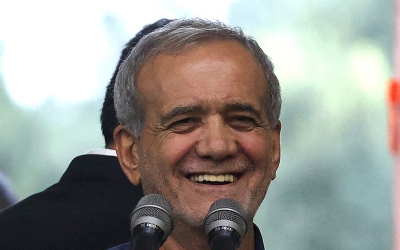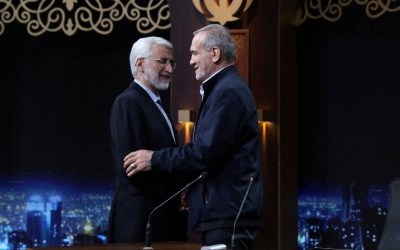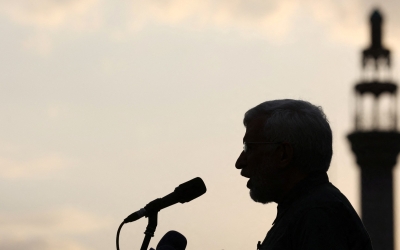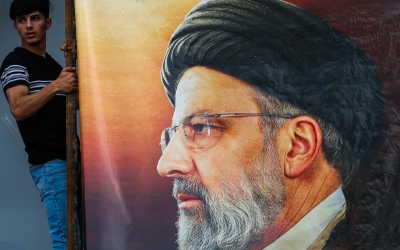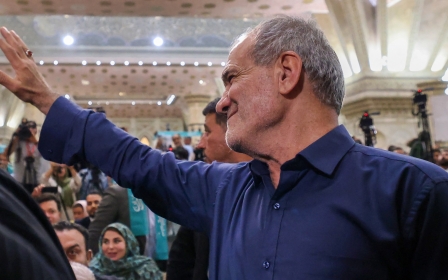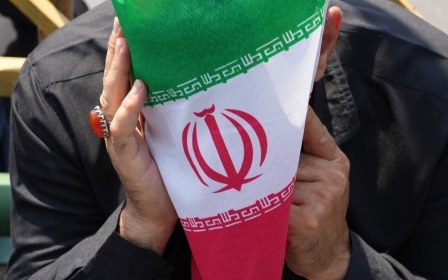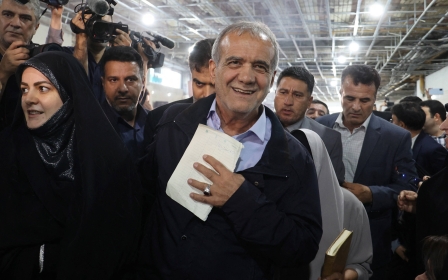The rise and unexpected fall of Iran's ultra-conservative Endurance Front
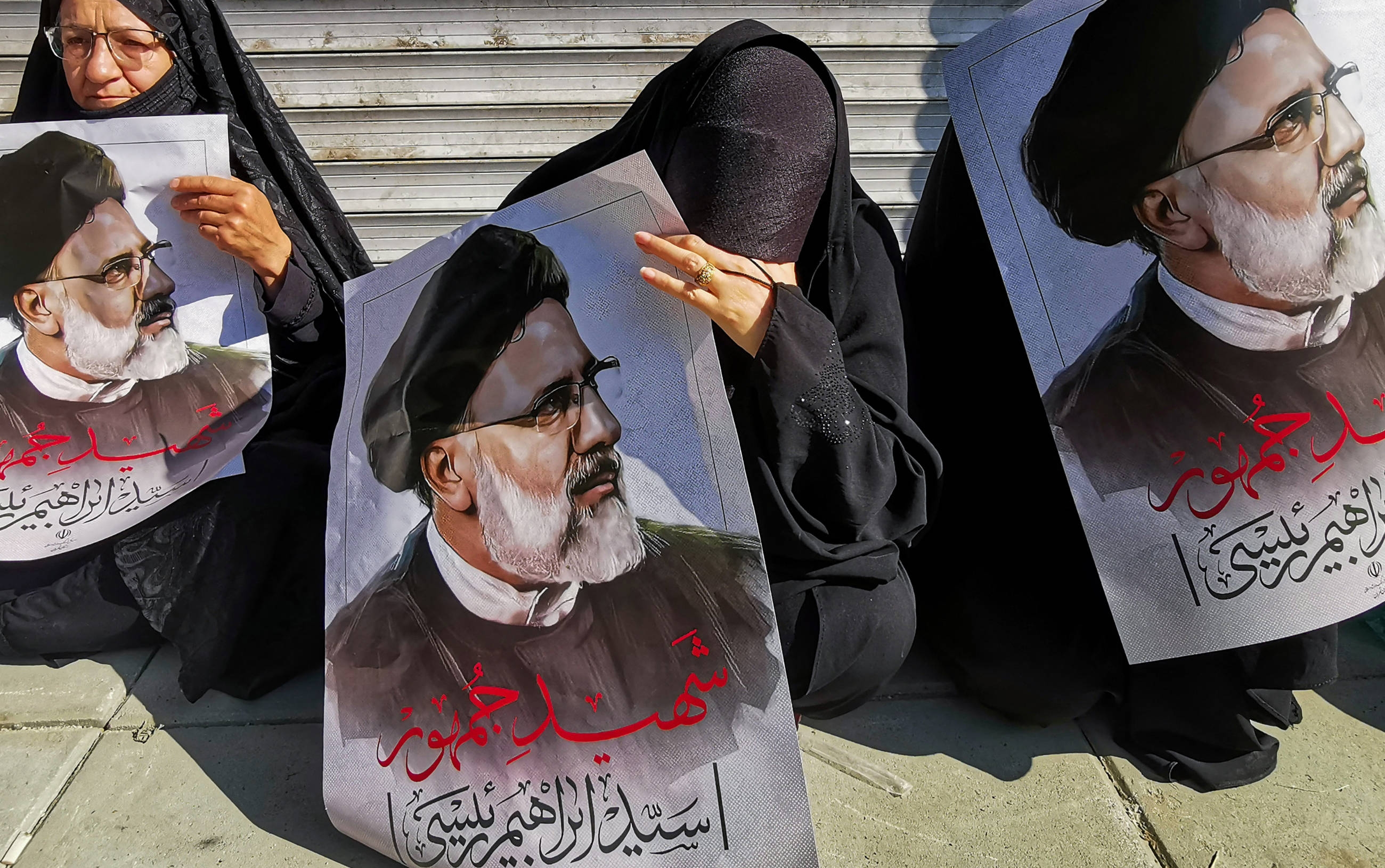
For years, a network of ultra-conservative figures embedded themselves across Iran’s political arena, steadily growing in power.
Up until two months ago, the Endurance Front, which became a party in 2014, wielded enough influence over decision-making centres to derail a nuclear deal with the West and remove prominent officials from their posts.
"The Endurance Front has infiltrated all levels of the Islamic Republic and the country," warned Rasoul Montajabnia, a senior reformist politician, two years ago.
However, when President Ebrahim Raisi, who was under its influence, was unexpectedly killed in a helicopter crash in May, the party's aspirations to see him succeed Supreme Leader Ali Khamenei died with him.
The Endurance Front suddenly found itself falling from the height of its power into an environment increasingly hostile to its agenda, with people from different political wings within the establishment working to dismantle its hold on Iranian politics.
New MEE newsletter: Jerusalem Dispatch
Sign up to get the latest insights and analysis on Israel-Palestine, alongside Turkey Unpacked and other MEE newsletters
The godfathers
The conception of the Endurance Front can be traced back to the strained relationship between Khamenei and former President Mahmoud Ahmadinejad.
In 2011, a rift between the supreme leader and his protege emerged when Khamenei reinstated the intelligence minister Ahmadinejad had dismissed. Feeling slighted, the then-president protested by staying at home for 11 days.
This move stunned Ahmadinejad's supporters and inner circle, who had previously lauded him for his unwavering obedience to Khamenei.
Consequently, key officials in Ahmadinejad's administration distanced themselves from him and merged into a new political network, the Endurance Front, before officially becoming a party.
The Endurance Front's main spiritual leader was Ayatollah Mohammad Taghi Mesbah Yazdi, an ultra-conservative senior cleric based in Qom who had forged strong ties with Khamenei, and eventually emerged as the primary theoretician of the Islamic republic.
A source formerly involved in conservative decision-making circles told MEE that Khamenei utilised Mesbah Yazdi as the leader of a new radical current to deter reformists from gaining power.
"The legitimacy of the Islamic republic is not dependent on the vote and consent of the nation, and the view of the nation has no influence or effect on its validity," Mesbah Yazdi said in 2005.
In 2002, a group of Basij paramilitary members carried out a series of killings in the southern province of Kerman, resulting in the deaths of five individuals, following a speech by Mesbah Yazdi.
During court proceedings, one of the perpetrators said: "Ayatollah Mesbah Yazdi had declared that it is the duty of people to 'enjoin good and forbid evil'." He then quoted Mesbah as saying: "If an individual persists in their previous actions, they should be brought before the court, and if they persist further, you have the right to kill them."
But Mesbah Yazdi was not alone in leading the Endurance Front.
Ayatollah Azizollah Khoshvaght, the father-in-law of Khamenei's son Mostafa and a radical senior cleric with influence in Tehran's seminary and religious ceremonies, also held significant power in the group.
During the 1990s, senior members of Iran's intelligence were implicated in the chain of murders of intellectuals and politicians who opposed Khamenei. Reformist media disclosed these murders, with then-deputy intelligence minister Saeed Emami reportedly confessing that a group of clerics, including Khoshvaght, had issued a general decree authorising these killings.
Khoshvaght passed away in 2013, while Mesbah Yazdi died in 2021. However, Mesbah Yazdi continued to play a central role in the Endurance Front's decisions.
Disagreement with traditional conservatives
In its code of conduct, the Endurance Front does not address the role of the people in governing the country, their rights or republicanism. Instead, it emphasises the importance of adhering to the supreme leader and establishing an Islamic state, society and civilisation.
When moderate cleric Hassan Rouhani won the presidency in 2013, conservatives contended that they could have defeated Rouhani without the influence of Mesbah Yazdi and the Endurance Front.
During that election, senior conservative clerics Ayatollah Mohammad Yazdi and Ayatollah Mohammad Reza Mahdavi Kani endeavoured to foster unity, persuading conservative candidates to withdraw in favour of a single conservative candidate.
Although they initially reached an agreement, Mesbah Yazdi and his faction refused to endorse the move. Instead, Mesbah threw his support behind ultra-conservative chief nuclear negotiator Saeed Jalili.
This divergence marked the Endurance Front's estrangement from traditional conservative factions.
Standing on the opposite end of the conservative spectrum, the Endurance Front clashed with conservatives over a range of issues - most notably the 2015 nuclear agreement, officially called the Joint Comprehensive Plan of Action (JCPOA).
Soon after Rouhani secured the deal, the JCPOA became a focal point of intense disagreement between pro-deal conservative and ultra-conservative lawmakers, including MPs affiliated with the Endurance Front, during heated debates in parliament before its ratification.
Tensions escalated when senior Iranian negotiators entered parliament to defend the agreement. In response, Ruhollah Hosseinian, a prominent Endurance Front MP, issued a threat against Ali Akbar Salehi, the top negotiator and head of Iran's atomic energy organisation.
"We will kill you and bury you under cement in the Arak reactor," Salehi shouted, repeating Hosseinian's words.
The drama continued as parliament convened to vote on the JCPOA, with Ali Asghar Hejazi, a mysterious and powerful figure from Khamenei's office, making a dramatic appearance in the session. His presence was interpreted as a clear signal to opponents and other MPs to support the agreement.
However, Endurance Front MPs rejected this notion, arguing that Hejazi's presence did not necessarily signify Khamenei's approval. Moreover, they unprecedentedly voiced criticism against Hejazi, who is considered second only to Khamenei in the office hierarchy.
The great division
The 2016 parliamentary election was a pivotal moment for the Endurance Front, leading to its informal division into two factions.
Following Rouhani's second-term victory, conservatives feared a potential takeover of parliament by a reformist-moderate coalition. Sensing this threat, conservatives aimed to forge a broad coalition to mitigate the risk of another electoral defeat. However, Mesbah Yazdi rejected this proposal.
Subsequently, Morteza Aghatehrani, then secretary-general of the Endurance Front, announced that he had held discussions with conservative leaders, affirming their commitment to the coalition. This position sharply contrasted with Mesbah Yazdi's stance.
This schism led to the inception of two distinct branches within the group: the Tehran branch, represented by Aghatehrani and Sadegh Mahsouli, a former commander for the Islamic Revolutionary Guard Corps (IRGC); and the Qom branch, which adheres to Mesbah Yazdi's political ideology.
While the Tehran branch adopted a pragmatic approach focused on accruing power, Mesbah remained idealistic: "One should support the right person who cares about the [1979 Islamic] revolution and Islam, even if that person is not able to attract votes.”
Despite their differences, both factions still draw upon the political and social ideologies of Mesbah Yazdi, who holds more radical views than Khamenei regarding religion, social liberties and foreign policy.
Influence on policy
During his presidency, Raisi was greatly influenced by his son-in-law, Meqdad Nili, a senior figure within the Endurance Front who wielded considerable influence in the government, one conservative source told MEE.
Mesbah Yazdi saw the late president as a "beacon of hope" for the religious community and supported him over two election cycles.
The party's clout during Raisi's tenure was evident in various areas, including the failed revival of the JCPOA.
A source close to the government revealed to MEE that, despite Raisi's foreign policy team nearing the finalisation of a deal with the US to revive the agreement two years ago, the group lobbied vigorously against it. This ultimately led Tehran to introduce new conditions and miss the opportunity to revive the deal.
The source said that Nili had considerable power in the appointment and removal of government officials. He played a pivotal role in dismissing Ali Shamkhani, the secretary of Iran's Supreme National Security Council (SNSC), who had brokered a deal with Saudi Arabia to restore diplomatic relations.
In terms of domestic policy, the Endurance Front was involved in designing socially restrictive bills, including a recent draft internet law that blocks access to social networks and the passing of a stringent hijab law that imposes heavy penalties on women who do not adhere to the Islamic dress code.
'Purification'
Purification, or purging, is a term used by observers to describe the actions taken by the Endurance Front to remove individuals and politicians perceived as obstacles to their objectives.
Among the prominent figures who have been sidelined in recent years is Ali Larijani, the former moderate parliament speaker who played a critical role in facilitating the JCPOA. Despite his advisory role to Khamenei, his unexpected disqualification from the 2021 presidential race highlighted the party's influence behind the scenes.
'The Endurance Front's next targets included Ali Asghar Hejazi, former moderate diplomat Ali Akbar Velayati and Mohammad Bagher Ghalibaf, the current parliament speaker'
- Senior politician
A senior politician within the conservative camp informed MEE that "Larijani was targeted for removal, especially as he posed a potential challenge to Raisi in presidential elections".
The source added: "The Endurance Front and Raisi's son-in-law were aiming to oust Raisi's vice president, Mohammad Mokhber, despite the leader's office advising his appointment."
"To my knowledge, the Endurance Front's next targets included Ali Asghar Hejazi, who opposed Raisi's ascension to supreme leadership; former moderate diplomat Ali Akbar Velayati, currently at the helm of the largest and most influential [Islamic] Azad University; and Mohammad Bagher Ghalibaf, the current parliament speaker."
Even Ghalibaf, a former IRGC commander known for his proximity to Khamenei's son Mojtaba, faced severe attacks from Nili as the Endurance Front vied for control over the parliamentary speakership.
In a 2022 leaked audio file, Mahdi Taeb, the brother of former IRGC intelligence chief Hossein Taeb, implicated Nili in spreading damaging material about Ghalibaf, including images showing him buying luxury items in Turkey.
This revelation appeared to have been a calculated move to undermine Ghalibaf's credibility among conservatives and the religious class.
The purification efforts aligned with the Endurance Front's ambitious agenda for the period following Khamenei's eventual passing.
The fight for succession
A former establishment official informed MEE that within a fractured Endurance Front, Nili and his inner circle were working to pave the path for Raisi to succeed Khamenei as the next supreme leader.
However, Raisi's unexpected death in a helicopter crash has unravelled their plans.
Additionally, the source said other factions within the Endurance Front had set their sights on two other candidates: Mesbah Yazdi's son, Mojtaba, and the radical sheikh Mohammad Mahdi Mirbaqeri.
The source noted that the Endurance Front also has to contend with a notable rival for the supreme leader post: Khamenei's son, Mojtaba, who is considered the most similar to Khamenei himself.
Before Raisi's death, the source added, Mojtaba had found himself in a weakened position after being sidelined by Khamenei due to his ambitious initiatives and the removal of his key ally, Hossein Taeb, from the IRGC's Intelligence Organisation.
However, Mojtaba has other powerful allies, making his potential candidacy still viable despite his father's position.
Last chance
After Raisi's death, Nili began investing in the ultra-conservative Jalili, according to a source within the conservative camp.
The source added that the only way for radicals, including Nili, to survive was through Jalili's victory in the presidential election, as he opposed any deal or interaction with the US.
'The establishment is now attempting to sideline the party from Iranian politics once and for all'
- Conservative source
Both wings of the Endurance Front then offered Jalili their full support.
But during the election campaign, the Endurance Front faced resistance from the establishment itself, which worked to curb the party's influence by not throwing its full weight behind Jalili, according to a senior conservative source in the establishment.
Despite pressure from senior principlists, Jalili refused to withdraw from the race to consolidate conservative votes for Ghalibaf, Khamenei's preferred candidate.
Consequently, Jalili ultimately lost the elections to Masoud Pezeshkian in a surprising defeat that saw Iran elect its first reformist president in two decades.
Raisi’s death and Jalili's defeat have dealt an "irreparable blow" to the political life of the Endurance Front, the source said.
"The establishment is now attempting to sideline the party from Iranian politics once and for all," he added.
Middle East Eye delivers independent and unrivalled coverage and analysis of the Middle East, North Africa and beyond. To learn more about republishing this content and the associated fees, please fill out this form. More about MEE can be found here.


